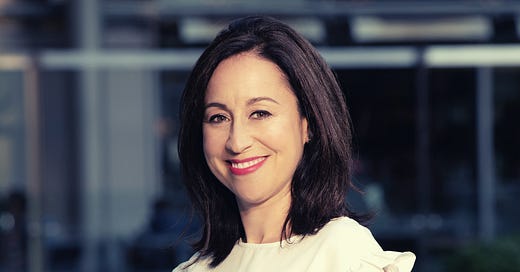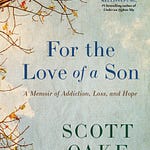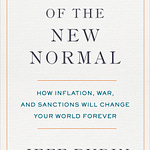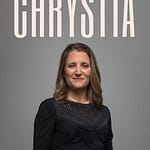Some months ago, I discovered a podcast that gripped me from its very first episode. It seemed to reach deep into my psyche, touching on all the things that I care about most. That podcast is Banished, from Substack’s Booksmart Studios, and it is a deeply thoughtful and nuanced look at the rising tide of censorship and intolerance. Its host is a remarkable academic who is fiercely committed to open inquiry.
Amna Khalid is an historian and a professor at Carleton College. She is a prolific writer of essays, often with her colleague Jeff Snyder, on the big issues of our time — including academic freedom, free speech, diversity, equity, and inclusion initiatives, and the controversy over Critical Race Theory in the classroom.
Today, Amna Khalid joins me to talk about how her early years in Pakistan fuelled her hunger for free expression, why she speaks out about intellectual conformity on campus, and where she gets her hope from.
TH: Amna, welcome to Lean Out.
AK: Thank you. It’s great to be here, Tara.
TH: So nice to have you here. I have been wanting to speak with you; I’ve been following your work, your essays, your podcast. One of the main goals of my own writing is to complicate the dominant narratives. I look to your work as an excellent example of this. I’m thinking of the very first episode of your podcast, on the subject of “problematic” public art, in this case the Victor Arnautoff murals in San Francisco. You had this rich, incredibly nuanced conversation about it. You say in the teaser to your podcast, back from last summer, that what you want most in life is to have these conversations. I relate to that so much. Do you think these conversations have been harder to find in recent years, given the state of our culture? Or somewhat easier, given the rise of independent media?
AK: It’s an interesting question. I have found it hard in the U.S. in particular, because things over here are polarized in a way that I haven’t experienced before. I’m an immigrant to the U.S., now an American citizen, but I’ve been here for about 11 years. I’ve really never lived in a country where the way you mow your lawn is indicative of your political loyalties. I’ve been amazed at how quick people are to judge. How keen they are to quickly figure you out, and slot you into a box, does make it much harder to have these conversations with some nuance, with complexity.
Having said that, I have to say that there are ways in which independent media has opened up interesting opportunities. Many of the conversations that I’ve been having over the last year would not have been possible without access to people. Which was actually the silver lining, if you will, of Covid; it does make access a lot more possible.
So, in some ways, no, I think it’s much harder to have these conversations because of the political climate of the country. But in other ways, yes, these places where you can have independent conversations has allowed people like you and other independent-minded people to come together in interesting ways and create places for these discussions.
TH: I think it is an exciting time for that piece, absolutely. I wanted to ask today, to start, about your background, about Pakistan — about what that experience was like, how that shaped how you look at the current moment.
AK: Let me begin by saying: I don’t want to pedal a narrative that I come from this hyper-marginalized community. That’s not the case at all. I come from a place of privilege in Pakistan; I’m not unaware of it. Privilege, for me, is not the bad word that it’s come to mean these days. So, I’m not looking to cash in on the victimhood narrative. That is of absolutely no interest to me. It would be false for me to be doing that, because I’ve not been a victim in any way.
Having said that, growing up under authoritarian regimes has posed its set of challenges. More than anything else, I think it’s allowed me to develop a sensibility where I appreciate the value of open thinking, of free thinking, which was certainly something that was constrained. Even someone like me, who comes from extreme privilege in the Pakistani context, felt constrained. I think that says something about what these kinds of authoritarian societies do; they narrow the scope for thinking, even amongst the privileged. Privilege is not a ticket out of that trap, of what you are meant to think.
I grew up in Pakistan under a whole series of military dictatorships … It’s a strange marriage of political authoritarianism, military authoritarianism, and religious authoritarianism. It was a kind of schizophrenic manifestation of authoritarianism. If you go to Pakistan, you’ll go to places that feel incredibly Westernized and you’d wonder what the problem is. And then you’ll go to other places where it’s extremely repressive. But the general atmosphere, when it comes to freedom of thought, is pretty strictly constrained.
Even before I knew it, I was hungering to have a place where I could think freely. And that informed my move away from home, first to Britain and now to the U.S. I think one of the reasons that I got involved in the kinds of conversations that you and I are having today is precisely because I started feeling a disillusionment about the nature of public discourse in the U.S. and particularly on academic campuses, which to me are sacred spaces that should be devoted to open inquiry. Seeing that space being narrowed has been one of the reasons that I’ve started doing this kind of work.
TH: Before we move on to campuses, I wanted to ask you about one of my favourite episodes of your podcast — your interview with the Pakistani artist Salima Hashmi. Such a rich conversation. One of the things that she talked about, looking at the West, was this horror of mob rule, and the calls for ambiguity and also for humour. Talk to me about what it was like for you going back to Pakistan after having been away, and having a conversation like that.
AK: It’s interesting, I went back after five years and I was really looking forward to it. I was thinking: Who can I get to speak to what’s happening in Pakistan today, but who also has the kind of institutional memory that can reflect on where Pakistan was back in the 70s and 80s? There’s no one better than Salima Hashmi for that, because of the range of her work. Human rights work, art activism — you name it, she’s done it.
For me, that interview was especially interesting because one of my problems — if I can be open — is that I’m impatient. My friends will tell you that I lose patience quickly. Because once I see a point, or an argument, I struggle to understand why I’m not being able to come across to someone else. Why does someone else not see what I’m trying to say?
It was very instructive for me to listen to Salima Hashmi. She’s been in the business of education all her life. And she said, “Pontificating gets you nowhere.” The way to actually change people’s hearts and minds is more indirect. She talked about humour. I must confess I enjoy good humour; I partake in it in my personal life. But in terms of when I’m making intellectual arguments, I’m not quite there yet. I’m still struggling to find the space to be humorous about those things. But it did make me stop and think about the different ways in which we communicate …
At a time when people are so polarized, and people have stopped listening, how do we find another avenue to get to them? That’s really when I started thinking about the voice that I write in. I don’t know if you’ve had a chance to listen to that one particular episode where I spoke about my own experiences and disillusionment with the West. It was a letter that I wrote to a loved one who now lives in Britain, reflecting on our journeys of moving away from home, in search of that kind of freedom. And finding ourselves — not in the same trap, far be it from me to compare American society to military regimes in Pakistan. But there is a certain dogma that’s in the air that feels familiar.
That voice clearly reached far more people than I had been able to reach with my argumentative pieces. So, it did open it up for me. We are living in times when “lived experience” is the currency, much to my irritation. I do value lived experience but I find it frustrating — especially in classes when I’m teaching — that lived experience becomes the end of a conversation. Whereas I really think it should be the beginning of a conversation.
TH: I agree with you completely. Part of the reason that I got into journalism is I want to hear people’s lived experience. I want to hear those stories. I want to hear the richness and the differences and the humanity of all of it. But, like you, I don’t want it to be the end of the conversation.
AK: Yeah. I think there is a tendency to do this kind of navel-gazing … I’m all for lived experience and looking at how it speaks to our moment, as long as you can place it in a bigger conversation … I don’t want to dismiss lived experience, but I think the dominant way of engaging with it right now is a way that is silencing conversation and silencing dissent, which is the opposite of how I think it should be used.
TH: Turning to campuses, your collaboration with Jeff Snyder began around 2016. Describe for me what you were seeing and feeling and experiencing in that moment.
AK: Let me begin by saying I was very naive and likely still am, particularly with respect to American higher education. Which sounds kind of silly coming from a professor. But given my trajectory — given that I didn’t go to grad school in the U.S., I went to grad school in England — there was a lot that I was learning about the American higher ed landscape.
It was in 2016 when our campus was considering instituting a Bias Response Team. I, quite by chance, went to a Town Hall to have a conversation about it. I was horrified by what the proposal was. I was horrified that this was being done in the name of progressive values. That if someone feels like they have been hurt because of someone’s biased speech or action, then that person can be held accountable. The straw that broke the camel’s back for me was that it didn’t matter what the intention of the individual was. All that mattered was impact. It reminded me a lot of conversations that I’d had in Pakistan, where people really reject nuance, reject complexity, because of religious dogma. I was troubled by that.
That’s when Jeff Snyder and I decided to write an article. Here is where my naivete is right on display for everyone. Both Jeff and I were junior faculty at that point; we did not have tenure. When we wrote that piece, it got a lot of attention nationally. My inbox started getting flooded by people saying, “You are so brave to do this, especially as junior faculty.” I didn’t even consider the implications of speaking up when you are untenured. But it also struck me as incredibly sad. Here I have this journey that I’ve made to the U.S. to have freedom of thought. And even here, people have to constrain themselves and worry about career consequences. That just isn’t what I’m in the game for.
So that was the beginning. And when we started looking into that, that was my eye-opening moment — to recognize how much of this stuff was going on across campuses in the U.S. It was chilling to me. I could see the impact that was having on the ability of people to express ideas on campus. If there’s one place you should be able to express your ideas in good faith, it is on campus. No matter how troubling the idea may be. Because this is the space where we hash things out.
TH: I wonder what it has been like for you. There’s a couple of things going on here. One is that this list of things that are off-limits — these topics that we’re not meant to discuss because they are too explosive — has been growing and growing and growing. Then: Leighton Woodhouse has a great piece on Substack talking about how in academia, there’s pressure not to speak to a mainstream audience. There’s this idea that your work is more serious if it’s only for the small group of people that are reading it. How have you navigated those dual pressures?
AK: Yeah, that is a very real pressure. I first want to recognize that a lot of academics have pressures on them to produce very specialized knowledge. One of the ways I’ve been fortunate is that I’m at a liberal arts institution and the pressures on us are slightly different from those at research universities, in that we’re not required to produce at this rapid pace. We are still required to produce, don’t get me wrong, but the rate is different. And so that allows us a little more room to play around.
Having said that, the pressures on us are very heavy in terms of teaching. We teach a lot. We spend a lot of time with our students. Perhaps that’s one of the reasons my fundamental commitment is to my students. It’s not the institution; it’s not the faculty. It is the students.
For that reason, I realized that much of what I’m trying to do is make accessible complex things to students who are undergraduates, who are just coming on board. And this is not that different from speaking to a public audience. So, in some ways, I realized that that was a strength that I had, that I could harness and hone.
In terms of navigating those pressures on campus, I’ll say it helps to have tenure. Much of the work that I’ve produced in this domain has been post-tenure … Carleton is, in this regard, very supportive. We have a lot of autonomy as academics to pursue what interests us. I’m trained as a South Asian historian and an historian of medicine. One would think none of that has anything to do with the conversations that I’m partaking in now. I would argue it has everything to do with them, because academic freedom, and freedom of thought, are absolutely essential to explore any topic.
But back to how I’ve navigated those [pressures]. Having tenure has been a huge boon. And it’s also led me to see that I have great frustration with my colleagues. I’m not talking about just colleagues at Carleton, but more broadly in higher education. My colleagues who have tenure, and who have not spoken out where they should have, where academic freedom is being eroded. I do firmly hold professors with tenure responsible for a lot of the negative changes that we see happening at academic institutions. I think tenure is a great privilege. I greatly value it. I think there is a reason why this is the only profession that comes with a lifetime guarantee of a job. And it comes with a particular responsibility for speaking up. I’m sorry to say that I think a lot of academics have forgotten that responsibility piece, and are quietly doing great work in their own areas, but not speaking up in ways that they should be — to protect the space for people to think freely, and speak freely.
TH: I think the same about journalists. I think it’s job number one right now to defend freedom of expression, free speech, open inquiry … When you look at the culture as a whole right now, both on campus and off, what do you see as the biggest threats to free speech, open inquiry, free debate?
AK: I feel the line between the sector of education and the public has become fuzzier recently. Which is not a bad thing. But for that reason, I think that many of the threats that we see to free expression in public discourse are the same threats that we see to academic freedom and open inquiry.
I’d say the biggest threat right now is coming from legislation that is trying to regulate what people can teach in schools and in universities, what are broadly known as anti-CRT bills. I think PEN America has the best term for them: “educational gag orders.” They were mainly targeting K through 12 education. This year, we are beginning to see a shift in that they are going for higher ed and public universities. It’s fascinating to me how this is even possible, given that they’ve fundamentally butt up against the first amendment … It’s going to be a long, drawn-out legal battle. I think that’s part of the intention of those who are crafting these bills. I think a lot of fear is engendered with this particular tactic, and that is the aim … So, that, I would argue, is the biggest threat.
Having said that, I think it’s not happening in a vacuum. I think there are threats both on the extreme right, and the extreme left, and they feed off each other. The tragedy is that in feeding off each other, they become increasingly more extreme.
On the extreme left, I would say there is this new dogma of what, for the lack of a better term, is diversity, equity, and inclusion initiatives on college campuses and beyond. And also, what my colleague Jeff Snyder and I refer to as Anti-Racism Inc. — which is this approach towards anti-racism based on Ibram Kendi’s work and Robin DiAngelo’s work. Which is extremely reductive, and, I think, counterproductive, and more divisive than anything else. I would say those are the two biggest threats, and it’s not a coincidence that they’re from the extremes, because they actually feed off each other. In so many ways, those on the extremes are more similar to each other than they think they are.
TH: It’s such an interesting point. You had a great podcast on this; Randall Kennedy was saying, “Listen, it’s important to teach CRT. If you don’t agree with it, let’s pick it apart in the classroom. Let’s talk about why.”
AK: Absolutely. The problem is that we seem to think that people are being taught things as the truth, in school or at college. To my mind, if that is the framework, then you will be anxious about anything that gets taught.
However, we can approach it differently and say, “Well, this is one framework, one framework for understanding social change or inequality. Some of them are stronger than others; some are weaker. But that doesn’t mean that we don’t teach them. We just don’t teach them as being true. We teach them precisely so that our students can see what is wrong with them.” To me, it’s not my job to tell a student which one is the right one — at the higher ed level, I’m talking — it’s for them to make up their own minds.
My job is to give them the tools to be able to analyze these different frameworks. I think what is labelled CRT — and there’s been so much written about this — it’s CRT-light. It is ideas inspired by what they think is Critical Race Theory. It is one way of looking at the world, a lens. A lens that I personally find problematic. But that doesn’t make me not want to have it in my class. In fact, it makes me, precisely for that reason, have it in my class. So that I can show my students: “Here it is. What do you think the shortcomings are?” And put it in conversation with other frameworks, so that students can begin to think for themselves. That’s what we should be doing …
The metaphor that comes to mind is disease; it’s like it’s going to infect them. Like there’s only one way that everyone’s going to respond. Which is not true. People respond to stimuli in many different ways. The same book that might have made someone into a dogmatic thinker may have been a reason for me to become a critical thinker, because I disagreed with it. We need to recognize that our children are autonomous. That we have a role, of course, to shape their thinking, but we don’t control every reaction that they have towards a particular stimulus.
TH: The time we’re in is full of these panics, as you say, on the left and the right. And the paternalism on both sides is worrying. I love it when I come across thinkers that look at it on both sides of the spectrum. Because I think it’s so important that we call it out wherever it appears.
AK: Yeah. And those are the people who have the least friends. [Laughs] I find myself belonging to no tribe. And everyone being skeptical when they come close to me, like, “Do we touch her? Do we not touch her?”
TH: [Laughs] I know the feeling.
AK: But, you know, I do think that it requires a certain amount of backbone to say some of the things that need to be said. There is a social cost. I think that’s part of the reason tenured faculty don’t speak out as much. They’re not worried about the economic costs; they have got secure jobs. They’re worried about the social costs. And those are real. But they’re just part of the story.
I feel like pandering to increasingly new demands for X, Y, and Z, doesn’t help eliminate them. It doesn’t satisfy people. We are in the business of education and that’s what we should focus on. We are not in the business of pandering. This kind of customer-is-always-right model that has come to dominate higher education is worrying to me. That’s not a new trend, but we are certainly seeing a new culmination of it in a new fashion right now.
TH: Indeed. I wonder where this all goes from here. It’s something I ask about a lot, and think about a lot. I’m so curious how other people think about this. I want to close by touching on Alice Walker, whom you interviewed for your podcast. Two things really stood out to me. One, she talked about cancellation as an economic imperative that seeks to strip agency from people within the culture. Such an interesting point. Two, she also believes that this moment that we are in is a passing one. One we may need to go through; one we must endure. And that our job, as thinkers, is to study it and learn from it. That is such a hopeful take. To what extent do you agree with that assessment?
AK: I think it is an incredibly hopeful take, and one that I definitely needed to hear at that point in time. It’s one that I often go back to in my mind. I do get despondent at times. The disillusionment piece in my life tends to weigh heavier than the hopeful note. But I really liked what she said about putting it in a longer frame. We tend to think that the moment we’re in is exceptional and the most important — this is where being a historian is also helpful. I do believe that her point about how we need to be paying attention, and to study it, is vital. That is part of what we’re doing. I think that’s part of why I like having these conversations, is to try and observe, to understand, to engage.
I think ultimately where I derive my hope from is when I’m interacting with my children. I can see that they are able to partake in these discussions in a way that is open-minded. And that gives me hope … There is something about human curiosity that cannot be hemmed in. It will find a way to persist, to ask, to question. I like thinking back to my conversation with Alice Walker. I like thinking back to my conversations with my children, the conversation with Salima Hashmi. Some of these discussions were very important for me, personally. Precisely because I was beginning to lose hope.
I remember talking to Nadine Strossen; she came to our campus and we had a fantastic conversation. And I asked her that question. I said, “Do you ever get disillusioned or despondent?” It was inspiring for me to hear her say, “Never.” She said, “No, I believe in the work that we do. I believe that this is vital and important, and people will come through it.” So those are some of the places that I go to in my mind to look for inspiration, to look for hope.
I think things will shift. I think that there are more of us who are speaking out. And by more of us, I don’t mean people who think the same way. It’s exactly the people who don’t think the same way, but who are willing to engage in conversation, that give me hope.
This transcript has been edited and condensed. For the full interview, download the podcast.















Share this post